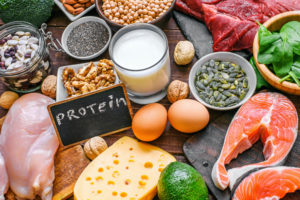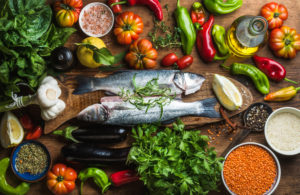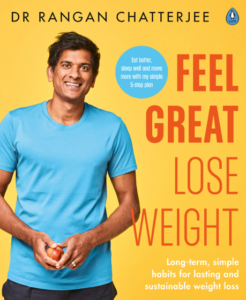Small Changes You Can Make to Lose Weight
 Implement some small changes every day to improve your diet and provide your body with the best fuel. You don’t have to change everything at once, keep things simple. For example, aim for an extra portion of fruit or veg, cook with olive oil or do 10 minutes of activity a day.
Implement some small changes every day to improve your diet and provide your body with the best fuel. You don’t have to change everything at once, keep things simple. For example, aim for an extra portion of fruit or veg, cook with olive oil or do 10 minutes of activity a day.
You are more likely to succeed if your changes are small and consistent. This will then give you the confidence to make more changes as you go on.
8 tips for changes to help you lose weight and feel healthier
1. Eat more protein
Filling up on protein helps us keep fuller for longer. Healthier sources of protein are found in:
- Dairy products like yoghurt
- Nuts
- Butter
- Eggs
- Beans and pulses
- Fish and lean meat
We need more protein as we age to reduce the level of muscle we lose as we age.
Having a protein rich diet helps reduces appetite and hunger levels. One study showed that simply increasing protein to nearly a third of calories made people eat almost 450 fewer calories per day, without actively restricting their intake.
Find out more about a high protein diet for weight loss
2. Fill up on fibre
One of the worst things about being on a diet is feeling hungry. An easy way to feel full is to fill up on fibre. Eating plenty of fibre is associated with a lower risk of heart disease, stroke, type 2 diabetes and bowel cancer.
To get enough fibre in your diet it is important to eat a variety of fibre-providing foods regularly, such as:
- Wholemeal bread
- Wholegrain breakfast cereals
- Brown pasta or rice
- Fruit
- Vegetables
- Peas
- Beans
- Nuts
- Seeds
- Potatoes with skins
Find out how to eat more fibre from the NHS
3. Eat the rainbow
Simply put, eating the rainbow involves eating fruits and vegetables of different colours every day. Their colours contain phytonutrients which strengthen the plant's immune system. Focusing on eating a variety of colours will increase your intake of different nutrients to benefit your health and help fight against chronic diseases.
Research done at Harvard School of Public Health, found that those who eat more flavonoid-rich foods, including oranges, peppers, celery and grapefruit, have lower levels of cognitive decline and dementia. (Flavonoids are a particular group of phytonutrients.)
4. Follow the Mediterranean way of eating
 Researchers have found that people who closely follow a Mediterranean diet may live longer and are less likely to put on weight. It has also shown that they have a lower risk of heart disease and type 2 diabetes.
Researchers have found that people who closely follow a Mediterranean diet may live longer and are less likely to put on weight. It has also shown that they have a lower risk of heart disease and type 2 diabetes.
The Mediterranean diet is a way of eating which is rich in the following foods:
- fruit
- vegetables
- healthy fats from olive oil
- fish
- a portion of nuts daily
- lean protein
- wholegrain.
Small amounts of red wine are allowed too!
Read BBC Food article 'What is the Mediterranean diet?' and our blog 'The Mediterranean diet - the perfect diet?' for inspiration.
5. Eat your greens
Your Grandma was right! - it’s important to eat green vegetables for our general health. Cruciferous vegetables such as broccoli, Brussel sprouts and kale may help protect us against cancer. They also provide us with fibre and vitamin C and are associated with a longer life.
Read more on how Cruciferous vegetables can boost life expectancy
6. Don’t forget water!
Water is best to quench your thirst and rehydrate. Many soft drinks are laden with sugar and full of calories or artificial colours and preservatives. When we are dehydrated we feel lethargic, dizzy and may get headaches.
7. Move more
Think about how you can introduce more movement into your day. This can be anything from gardening, chair-based yoga, physiotherapy led Pilates, or even bouncing on an exercise ball. Increasing the amount of movement we can do not only keeps us active, keeps our muscles and joints supple, but also releases feel good hormones to help boost our mood.
Find out more from our Getting Active pages
Use our Activity Buddie service if you need support to help you get active. One of our trained volunteers will work with you to make a plan to increase your activity that suits you.
8. Don’t forget sleep and mood
 If we have persistently poor sleep, we are more likely to make poor food choices the next day and consume more calories. Poor sleep also affects our body’s hormones leading us to feel more hungry.
If we have persistently poor sleep, we are more likely to make poor food choices the next day and consume more calories. Poor sleep also affects our body’s hormones leading us to feel more hungry.
Take a look at Charlotte's sleep blog in which she shares her experience of improving her sleep.
Depression and anxiety can also affect our appetite and change the relationship that we have with food. It can cause us to eat unhealthily and/or eat more than usual.
Please speak to our Medical Advisers or your GP if you're worried about your mood or lack of sleep.
Use our Lift-Up service for support if you are experiencing low mood
Use our Talk Together service if you're feeling lonely or isolated
Further resources
Feel Great lose Weight

Read Dr Chatterjee’s book on staying in shape, staying healthy and living well

